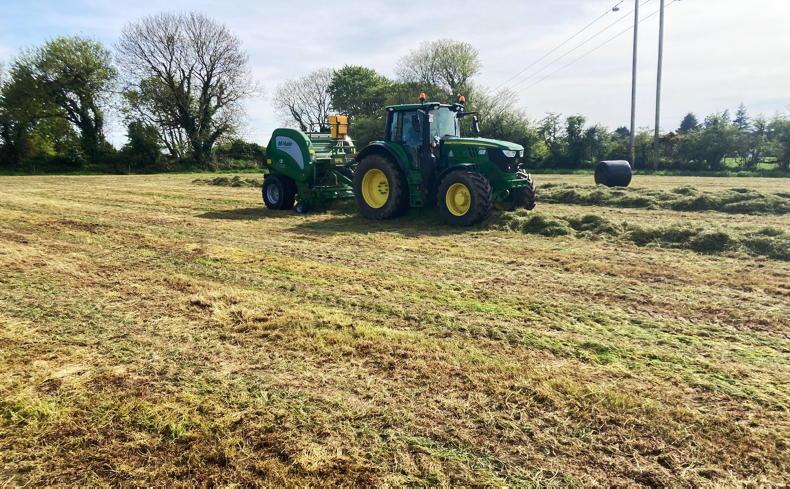Inland Fisheries Ireland (IFI) officers carried out 2,736 investigations in agricultural and rural settings to identify environmental risks or active pollution incidents in 2024.
The IFI released the figures as it appeals to farmers and contractors to help protect Ireland’s rivers and lakes from agricultural pollution during the silage cutting season.
Livestock manure and other organic fertilisers, silage effluent and soiled water are highly damaging substances and on entering a watercourse can kill fish and severely impact their habitats.
IFI head of operations Barry Fox said farmers and contractors should take all possible precautionary measures to stop harmful materials seeping into the water over the summer months.
"With water levels currently very low, with elevated temperatures, fish are particularly vulnerable to external pressures,” he said.
Contact
Farmers and contractors are also asked to contact their local IFI office before carrying out works in or near any watercourses.
IFI urges the public to report any instances of distressed fish, fish kills or pollution to its confidential 24/7 number on 0818 34 74 24.
"Poor farmyard management and poor slurry spreading practices following a silage cut can harm local fish populations and ruin their habitats,” added Fox.

Silage being cut by a farmer. \ IFI
"Agricultural communities continue to play a pivotal role in the responsible stewardship of our environment.”
Follow the SILAGE acronym
Spread slurry during dry weather only and never when a period of heavy rain is forecast.Investigate if silage pits are properly sealed to prevent the entry of water and/or if there is leakage from the slabs. Lead slurry away from a watercourse when working the land. Be aware of the slope of the field and respect the buffer zones near a river, lake, stream or shoreline.Avoid allowing effluent or any other discharge reaching the clean water drainage on a yard.Generate good yard cleaning practices to stop effluent and soiled washings from inadvertently flowing to a watercourse.Engage with statutory requirements by ensuring that adequate storage capacity for slurry, soiled water and silage effluent meets the regulations. Read more
1,500 Dairygold suppliers complete nutrient balance consultations
Over half of septic tanks checked failed inspection last year
Beef and sheep farmers more likely to take up water quality measures
How much nitrogen to spread this summer?
Inland Fisheries Ireland (IFI) officers carried out 2,736 investigations in agricultural and rural settings to identify environmental risks or active pollution incidents in 2024.
The IFI released the figures as it appeals to farmers and contractors to help protect Ireland’s rivers and lakes from agricultural pollution during the silage cutting season.
Livestock manure and other organic fertilisers, silage effluent and soiled water are highly damaging substances and on entering a watercourse can kill fish and severely impact their habitats.
IFI head of operations Barry Fox said farmers and contractors should take all possible precautionary measures to stop harmful materials seeping into the water over the summer months.
"With water levels currently very low, with elevated temperatures, fish are particularly vulnerable to external pressures,” he said.
Contact
Farmers and contractors are also asked to contact their local IFI office before carrying out works in or near any watercourses.
IFI urges the public to report any instances of distressed fish, fish kills or pollution to its confidential 24/7 number on 0818 34 74 24.
"Poor farmyard management and poor slurry spreading practices following a silage cut can harm local fish populations and ruin their habitats,” added Fox.

Silage being cut by a farmer. \ IFI
"Agricultural communities continue to play a pivotal role in the responsible stewardship of our environment.”
Follow the SILAGE acronym
Spread slurry during dry weather only and never when a period of heavy rain is forecast.Investigate if silage pits are properly sealed to prevent the entry of water and/or if there is leakage from the slabs. Lead slurry away from a watercourse when working the land. Be aware of the slope of the field and respect the buffer zones near a river, lake, stream or shoreline.Avoid allowing effluent or any other discharge reaching the clean water drainage on a yard.Generate good yard cleaning practices to stop effluent and soiled washings from inadvertently flowing to a watercourse.Engage with statutory requirements by ensuring that adequate storage capacity for slurry, soiled water and silage effluent meets the regulations. Read more
1,500 Dairygold suppliers complete nutrient balance consultations
Over half of septic tanks checked failed inspection last year
Beef and sheep farmers more likely to take up water quality measures
How much nitrogen to spread this summer?











SHARING OPTIONS